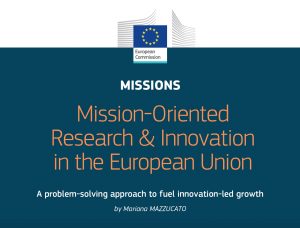 As a response to the Commission public consultation on the report of Professor Mariana Mazzucato on ‘Mission-Oriented Research and Innovation in the European Union – A problem solving approach to fuel innovation-led growth‘ Insight Foresight Institute remits the following suggestions for wider consideration on the implementation of the mission-oriented innovation policy in Europe.
As a response to the Commission public consultation on the report of Professor Mariana Mazzucato on ‘Mission-Oriented Research and Innovation in the European Union – A problem solving approach to fuel innovation-led growth‘ Insight Foresight Institute remits the following suggestions for wider consideration on the implementation of the mission-oriented innovation policy in Europe.
‘Criteria for how EU research and innovation missions should be selected.’
EU R&I missions should be bold, inspirational with wide societal relevance and cross-disciplinary, cross-sectoral and cross-actor efforts. It may be worth considering also the areas where EU has the greatest potential to contribute based on its capacities and competitive strengths.
The mission, while being a broad statement, also holds the risk of being too abstract to be targeted, measurable and time-bound. Furthermore, the notion of multiple bottom up solutions may counter to the expectation of realistic actions since if it is known to be realistic then why would multiple paths be needed. Ultimately the missions being bold they also entail the risk and uncertainty, for instance suggesting difficulties in setting the right time-bound criteria at the outset. The visions as such would better avoid also artificial limits for improvement. For instance, in case of reducing carbon emissions, the mission could well target going even beyond carbon neutral.
For mission-oriented policies to be truly systemic the missions would be better framed with systemic visions encompassing multiple-dimensions on the future techno-institutional and socio-economic systems. The experimentation of the alternative pathways would still be guided by such systemic visions and help identify complementarities and synergies of diverse efforts. In particular, without such systemic visions, there exists a risk of repeating the issues confronted in earlier efforts like in case of the European partnerships that tended to result to the broad networks of rather fragmented projects.
Defining the mission around a single criterion like a carbon neutral city or plastic free ocean holds the risk of losing some focus on other relevant criteria for development, consider for instance the hailed diesel engines as a low carbon solution that led to the rise of other serious air emissions. The very idea of sustainable development is to simultaneous explore win-win-win solutions across economic, social and ecological challenges.
‘Implementation of research and innovation missions’
The extensive inclusion of actors from a diverse group of European countries, including central and peripheral countries and regions can be an invaluable asset. However, national and regional stakeholders may too often have competing agendas that reduce the focus to serving neither and risk not addressing the needs of the largest constituency of society. Therefore, the intensity of the engagement of different stakeholders is better driven by their competencies and specific purpose of each mission. It is important that the best talents find their way to contribute the missions. Any calls for proposals of R&I projects may leave some high potential talents excluded. Here the good practices of ERC might be worth a consideration. Missions could also seek closer coordination with international organizations and other third countries.
An impartial appraisal of the progress and the impact as well as the flexible management are the key for effective missions. The implementation of EU R&I missions should be flexible, with pro-active management and building in-house capabilities and through a portfolio of instruments to foster bottom up solutions. The timelines and milestones set in the outset are better revised based on the improved understanding attained along the implementation phases of ambitious missions entailing uncertainties.
‘Citizens should be consulted on the choice of missions’
A broad consultation may benefit the exploration and definition of possible missions to better address societal needs and avoid bias over any single actor. However, this may become demanding from a methodological point of view (whom to consult, by which channels, using which methods) and turn out to be time-consuming, especially to thoroughly process the opinions and suggestions collected, and thus rather expensive.
Furthermore, framing a mission may require considerable technical and context specific understanding which reduces the value or suitability of public consultation or referendum for purpose of the selection or priority setting of missions. This would assume that the citizens have been educated sufficiently to understand the issues and the challenges related to the mission. Missions might be proposed to be a subject of public consultation even in situations where the citizens may not be related to due to lack of direct experience or the benefits of the mission being too far in the future.
Hence, the views of stakeholders and diverse set of citizens might be best integrated in early exploratory phases (e.g. via foresight) rather than in the later phases of the policy cycle when the mission has been largely defined and the consultation may merely seek for ‘approval’. One way for developing citizen insight on issues is the use of living labs and new methods of user-centred design for feedback. This process may facilitate a broad cross section of individuals from society.
‘Ideas for EU research and innovation missions’
- Smart Energy Systems. Europe can lead the transition towards distributed and smart energy systems for enhancing sustainable production, distribution and storage of energy.
- Cradle to Cradle Economy. The EU should become world leader in sustainability transition following the cradle to cradle design principles and learning from the experimentation across different sectors.
- Intelligent Reforestation. European forest management could gain momentum with new sustainable smart solutions for reforestation as means to fight desertification and mitigate the impacts of climate change.
- Beyond Jobs. Europe should lead a new way to understand that jobs are only a means. Social innovation is urgently needed to develop alternatives to jobs as the only way to gain access to wealth.
- Digital Democracy. Europe can lead exploiting the capabilities of technology to create an open and engaged society while making the most of “collective intelligence”. Democracy should be understood as a better way to solve certain complex social problems than markets or hierarchies.
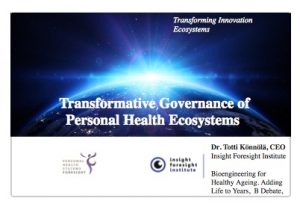 Invited speech of Dr. Totti Könnölä, CEO inf Insight Foresight Institute in the scientific conference ‘Bioengineering for Healthy Ageing. Adding Life to Years’ November 9th 2017, CosmoCaixa Barcelona.
Invited speech of Dr. Totti Könnölä, CEO inf Insight Foresight Institute in the scientific conference ‘Bioengineering for Healthy Ageing. Adding Life to Years’ November 9th 2017, CosmoCaixa Barcelona.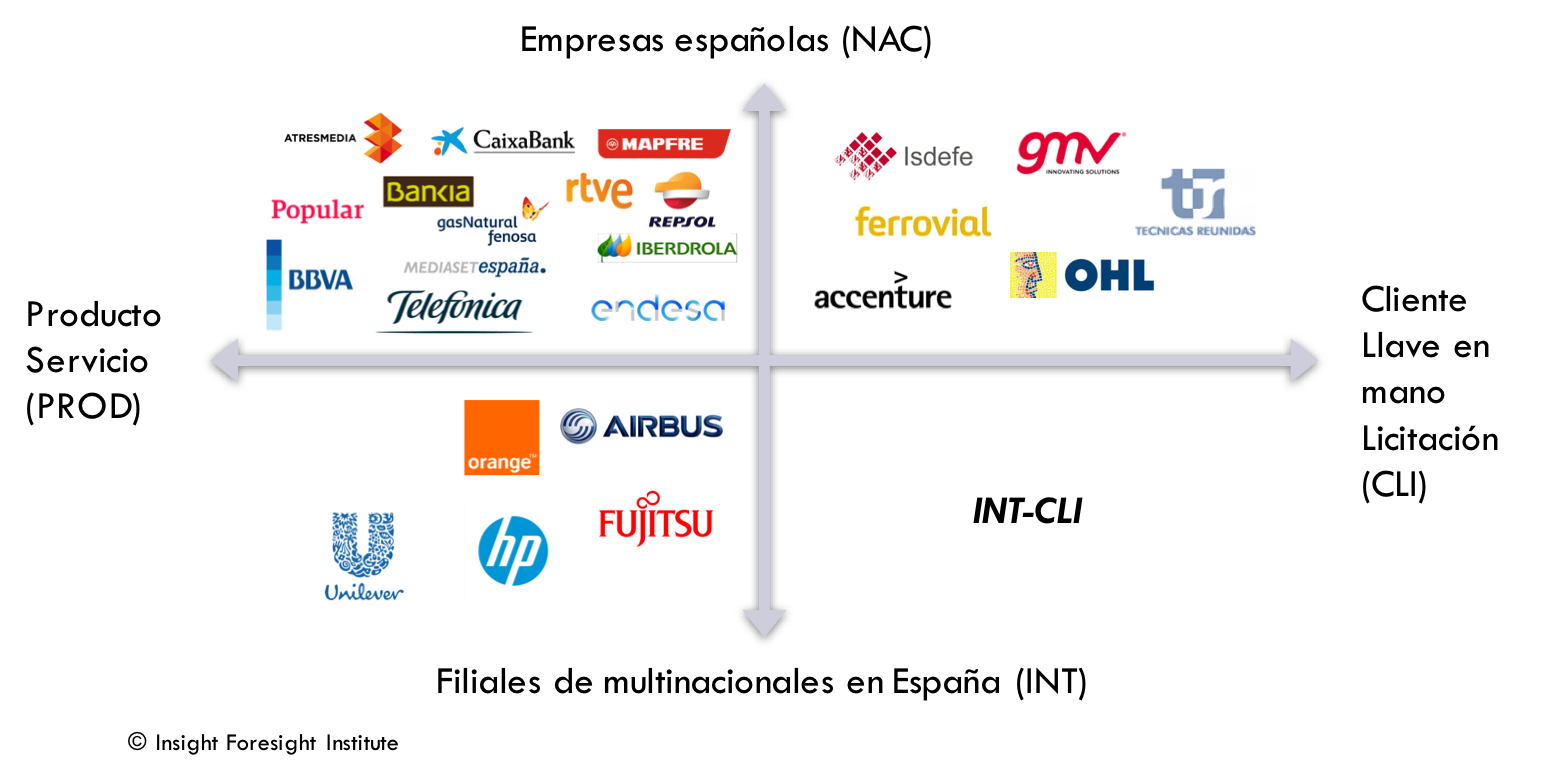

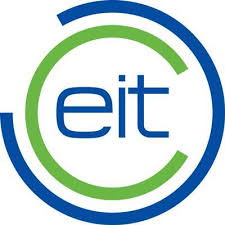 José Manuel Leceta, General Manager of Red.es, and Totti Könnölä, CEO of Insight Foresight Institute write on their experiences on the EIT. The article was presented in the seminar “Growth ecosystems as a tool in the new industrial and innovation policy” organised by by SITRA and Ministry of Economy and Employment of Finland.
José Manuel Leceta, General Manager of Red.es, and Totti Könnölä, CEO of Insight Foresight Institute write on their experiences on the EIT. The article was presented in the seminar “Growth ecosystems as a tool in the new industrial and innovation policy” organised by by SITRA and Ministry of Economy and Employment of Finland.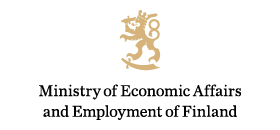 The Ministry of Economic Affairs and Employment, the Finnish Funding Agency for Innovation TEKES and the Finnish Innovation Fund SITRA organised in autumn 2016 an international workshop to compile international research data on developing ecosystems. Totti Könnölä, CEO of Insight Foresight Institute, presented the paper “Co-creating Pan-European Innovation Ecosystems: reflections from the EIT”.
The Ministry of Economic Affairs and Employment, the Finnish Funding Agency for Innovation TEKES and the Finnish Innovation Fund SITRA organised in autumn 2016 an international workshop to compile international research data on developing ecosystems. Totti Könnölä, CEO of Insight Foresight Institute, presented the paper “Co-creating Pan-European Innovation Ecosystems: reflections from the EIT”.